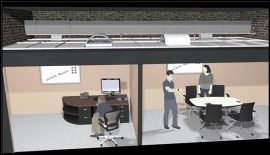by Brianna Crandall — June 11, 2014—Test results announced June 9 could provide hope for office workers who are constantly bombarded by ambient noise from adjoining cubicles or offices, and a tool for facilities managers tasked with dealing with space and noise issues. The results deliver proof of a low-cost way to dramatically reduce the amount of that noise, enabling office workers to function more effectively and securely.
The announcement was made at NeoCon, North America’s largest design exposition and conference. AcoustiCAP is on display in Suite 3083 on the eighth floor of Chicago’s Merchandise Mart.
Although increased collaboration and therefore collaboration-enabling workspaces are seen as necessary and desirable for business growth and innovation, the constant noise level in offices is taking a toll on workers, points out AcoustiCAP.
Studies indicate that office noise disrupts concentration, decreases productivity and increases stress, according to a Harvard Business Review article. Confidentiality is also an issue in offices where private conversations can be overheard. Researchers at the University of California, Berkeley, found that people are significantly more dissatisfied with the lack of speech privacy than noise level.
The tests, conducted by NGC Testing Services, show that offices outfitted with AcoustiCAP devices demonstrated a reduction of 33 percent in high-frequency office-to-office ambient noise, compared with offices that did not have the devices installed. That is especially important at companies where privacy is a prime concern, notes the company.
The NGC tests revealed that AcoustiCAP, placed on top of standard 24″ x 24″ return air grilles in an office setting, reduced the sound transfer rating (CAC) of medium-frequency noise, or normal speaking range, from one office to another by more than 31 percent. The CAC increased even more, by one-third, when two feet of sound blankets were installed on either side of the common demising wall in addition to the AcoustiCAP.
AcoustiCAP uses a convex section of sheet metal that is coated in absorptive material and curved into a parabolic shape to keep sound in the room in which it was generated. The unique solution is designed to allow for maximum airflow, while providing sound absorption and attenuation to prevent noise from traveling above the ceiling. The devices are installed perpendicular to each other so sound does not have a direct route from one vent to another.
“By significantly cutting the ambient intra-office noise level, it enables people to concentrate on their work, and get more done,” said Shaun Mannix, principal at Transwall, which markets and sells AcoustiCAP throughout the United States.
AcoustiCAP technology is the result of a federal government research project, which sought to reduce the ambient, unwanted speech traveling from office to office in government facilities. It is a problem, however, that increasingly is faced by companies of all sizes nationwide; sound travels between offices, sneaking through the smallest openings, notes the company. With office workers spending a majority of their time doing solo work that requires concentration, the need for quiet has increased, especially with the proliferation in desk/benching systems and lower workstation panels.

AcoustiCAP devices are said to be easy to install, with no resultant itch or skin irritation or formaldehyde. They also offer a Class A fire rating and resist microbial growth, says the company. More information about the NGC test results and about AcoustiCAP is available from the company’s Web site.
Founded in 1963 and based in suburban Philadelphia, Transwall is a developer and manufacturer of movable floor-to-ceiling and architectural wall systems. Transwall offers a broad array of product and solutions, including movable architectural walls, glass wall systems, sound management and office cubicle systems. Clients include architects, designers, contractors, builders, business owners, the General Services Administration (GSA) and other government agencies. Transwall solutions have reportedly been installed at the Pentagon in Washington, Morgan Stanley’s offices in New York, and TD Ameritrade’s headquarters in Omaha.





